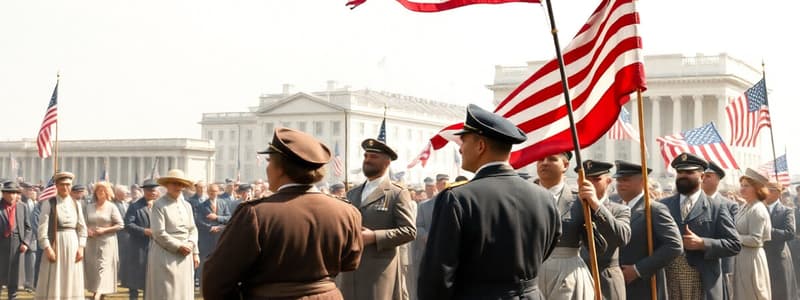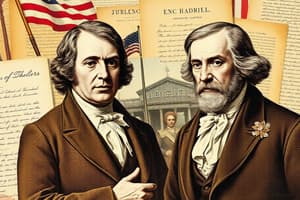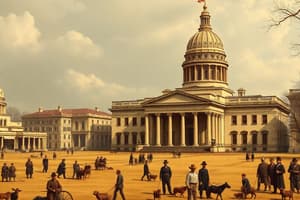Podcast
Questions and Answers
What was the primary focus of the Pendleton Civil Service Act?
What was the primary focus of the Pendleton Civil Service Act?
- Eliminating all government jobs
- Awarding government jobs based on merit (correct)
- Establishing a federal income tax
- Increasing government job salaries
What amendment to the Constitution banned alcohol in the United States?
What amendment to the Constitution banned alcohol in the United States?
- 17th Amendment
- 16th Amendment
- 19th Amendment
- 18th Amendment (correct)
Which term describes a situation where one company has full control over an industry?
Which term describes a situation where one company has full control over an industry?
- Partnership
- Corporation
- Oligopoly
- Monopoly (correct)
What was the primary purpose of the New Deal?
What was the primary purpose of the New Deal?
What does the term 'laissez-faire' refer to in economic policy?
What does the term 'laissez-faire' refer to in economic policy?
What was the main goal of the temperance movement?
What was the main goal of the temperance movement?
The 19th Amendment to the U.S. Constitution granted what right?
The 19th Amendment to the U.S. Constitution granted what right?
Which act aimed to regulate trade between states and railroads?
Which act aimed to regulate trade between states and railroads?
What does the term 'Gilded Age' refer to?
What does the term 'Gilded Age' refer to?
Who was the leader of Nazi Germany during World War II?
Who was the leader of Nazi Germany during World War II?
What was one of the main causes of the Great Depression?
What was one of the main causes of the Great Depression?
Which event contributed to the U.S. entering World War I?
Which event contributed to the U.S. entering World War I?
What was one economic impact of the Spanish-American War on the U.S.?
What was one economic impact of the Spanish-American War on the U.S.?
What was a primary purpose of the FDIC?
What was a primary purpose of the FDIC?
Which of the following was a progressive reform introduced by Theodore Roosevelt?
Which of the following was a progressive reform introduced by Theodore Roosevelt?
Which impact did the assembly line have on automobile production?
Which impact did the assembly line have on automobile production?
How did the U.S. acquire Hawaii?
How did the U.S. acquire Hawaii?
What was a significant impact of the Great Depression?
What was a significant impact of the Great Depression?
What caused tariffs to negatively impact the economy during the Great Depression?
What caused tariffs to negatively impact the economy during the Great Depression?
What did Tocqueville identify as an important American value?
What did Tocqueville identify as an important American value?
Flashcards
The Gilded Age (Late 1800s)
The Gilded Age (Late 1800s)
A time of rapid economic growth, often accompanied by corruption and social inequality. It was a period of significant industrialization and technological advancements but also saw the rise of monopolies and the exploitation of labor.
Laissez-Faire
Laissez-Faire
A political philosophy that favors minimal government intervention in the economy. Businesses are allowed to operate with little or no regulation. This approach often emphasizes free markets and individual liberty.
Temperance Movement
Temperance Movement
A political movement that aimed to stop the production and sale of alcoholic beverages. It gained momentum in the early 20th century and led to the passage of the 18th Amendment, prohibiting alcohol in the United States.
Imperialism
Imperialism
Signup and view all the flashcards
Nationalism
Nationalism
Signup and view all the flashcards
Tenements
Tenements
Signup and view all the flashcards
Militarism
Militarism
Signup and view all the flashcards
Monopoly
Monopoly
Signup and view all the flashcards
Hoovervilles (during the Great Depression)
Hoovervilles (during the Great Depression)
Signup and view all the flashcards
Prohibition
Prohibition
Signup and view all the flashcards
Great Depression
Great Depression
Signup and view all the flashcards
Bank Failures
Bank Failures
Signup and view all the flashcards
Social Security
Social Security
Signup and view all the flashcards
Assembly Line
Assembly Line
Signup and view all the flashcards
How the US Got Hawaii
How the US Got Hawaii
Signup and view all the flashcards
Tariffs in the Depression
Tariffs in the Depression
Signup and view all the flashcards
World War I
World War I
Signup and view all the flashcards
Gilded Age
Gilded Age
Signup and view all the flashcards
Populist Party
Populist Party
Signup and view all the flashcards
Study Notes
Key Historical Periods and Concepts
- Gilded Age (late 1800s): A period of rapid economic growth, but also rampant corruption and hardship for many.
- Progressive Era: Focused on social and economic reforms, addressing issues like trust-busting, conservation, and labor rights.
- Great Depression (1929-1939): A severe economic downturn caused by stock market crash, bank failures, and overproduction, leading to widespread unemployment and poverty.
- World War I (1914-1918): A global conflict with significant impacts on the US, including the involvement of American Expeditionary Forces and the Treaty of Versailles.
- World War II (1939-1945): A global war rooted in the invasion of Poland by Germany; the U.S. played a crucial role in the Allied victory.
Key Political and Social Concepts
- Neutrality: Staying out of foreign conflicts.
- Prohibition (1920-1933): A nationwide ban on alcohol in the U.S.
- Monopoly: One company's control of an entire industry.
- Tenement Housing: Overcrowded, poor-quality housing, common for urban workers.
- Laissez-faire: Minimal government interference in business.
- Pendleton Civil Service Act: Established a merit-based system for government jobs.
- Civil Service: Government jobs given based on qualifications, not political connections.
- Nationalism: Strong devotion and pride in one's country.
- Militarism: Building up a strong military.
- Alliances: Agreements between countries for mutual support in conflict.
- **Imperialism:**Expanding a nation's power through acquiring colonies.
- Nativism: Opposition to immigration.
- Temperance: A movement advocating for moderation in alcohol consumption, leading to Prohibition.
- 16th Amendment: Created the federal income tax.
- 17th Amendment: Allowed direct election of senators.
- 18th Amendment: Established Prohibition.
- 19th Amendment: Granted women the right to vote.
- 14 Points: Woodrow Wilson's plan for post-WWI peace.
Key Economic and Social Issues
- Tariffs: Taxes on imported goods.
- Commerce: Business and trade of goods.
- Hooverville: Shantytowns of the homeless during the Great Depression.
- Bank Failures: Widespread closures of banks during the Great Depression, leading to loss of savings and credit crisis.
- Causes of the Great Depression: Stock market crash, bank failures, overproduction, and global economic downturn.
- Reasons for U.S. Entry into WWI: Unrestricted submarine warfare and the Zimmermann Telegram.
- Economic Impact of Spanish-American War: U.S. secured new overseas markets and territories.
- Treaty of Versailles: Ended WWI, but imposed heavy reparations on Germany.
- Assembly Line: Improved efficiency and lower costs in manufacturing, particularly in automobile production.
- Transcontinental Railroad: Connected the U.S. and boosted trade.
- Social Security: Provides retirement income support to citizens.
- FDIC (Federal Deposit Insurance Corporation): Insures bank deposits.
Key Figures and Events
- Charles Lindbergh: First solo flight across the Atlantic
- Franklin D. Roosevelt (FDR): President during the Great Depression and WWII, implemented the New Deal.
- Sanford B. Dole: Played a key role in the annexation of Hawaii.
- Jane Addams: Founded Hull House (assistance to immigrants and the poor).
- Alexis de Tocqueville: French observer of U.S. democracy.
- Upton Sinclair: Author of 'The Jungle', exposing meatpacking industry abuses.
- Alfred T. Mahan: Advocated for a strong U.S. navy.
- Warren G. Harding: President who promoted "Return to Normalcy".
- Adolf Hitler: Leader of Nazi Germany.
- Theodore Roosevelt: Progressive president, known for conservation efforts and trust-busting.
- Herbert Hoover: President during the Great Depression.
- Dawes Act: Divided Native American lands to encourage farming.
- Chinese Exclusion Act (1882): Prohibited Chinese immigration to the US.
- Homestead Act: Gave free land to settlers in the western US
Key Legislation
- Interstate Commerce Act: Regulated railroads and trade among states.
- New Deal: FDR's programs aimed at relieving the Great Depression.
- American Federation of Labor (AFL): A union for skilled workers.
Additional Concepts
- Demographic: Statistical characteristics of a population.
- Beneficiaries: Those who benefit from a program or event.
- Assimilate: To adopt the culture of another group.
- Palmer Raids: Government raids targeting suspected radicals.
Studying That Suits You
Use AI to generate personalized quizzes and flashcards to suit your learning preferences.




